Retaining walls are an important feature in many construction projects, often a necessity, as they can provide a solution where land is uneven or sometimes at a significant gradient. Very few construction sites are completely flat and where site levelling is not possible it may be necessary to consider retaining walls as a way of maximising development space, or solving access issues within or around a construction site.
Wordnetweb (Online) define a retaining wall as ‘a wall that is built to resist lateral pressure (especially a wall built to prevent the advance of a mass of earth)’. There are many considerations that will affect the type, size and construction of a retaining wall which in most cases require the advice of a professional such as a Structural Engineer. This is because there are lots of pressures/forces occurring behind a retaining wall that can significantly influence the stability of a retaining wall. The photographs below show the dramatic impact of what can happen when retaining walls fail:
 |
| Source:
wivinah-hefner.blogspot.co.uk |
 |
| Source: Source:
http://wqad.com/ |
 |
| Source: http://www.thestar.com.my/ |
 |
| Source:
http://blogs.agu.org/ |
 |
| Source:
http://www.nibiru-planetx.com/ |
I published an article a few weeks ago on basement construction where I considered the influence of ground water and particularly hydrostatic pressure on the basement structure (Link). This is also a significant factor when designing retaining walls, which if not controlled can effectively push against the internal face of the wall and cause it to fail. So in addition to all of the forces that will potentially affect a retaining wall, other factors for consideration will include the type and nature of the soil, the types of wall construction to be used, materials to be used in the wall construction, ease and speed of construction, the provision of expansion joints, health & safety issues and obviously cost! As you can imagine there is an awful lot to think about and it is no surprise that professional advice may be needed.
In next week's article I will discuss retaining wall construction and consider different types of retaining wall.
Please feel
free to share this article and other articles on this site with friends,
family and colleagues who you think would be interested

No comments:
Post a Comment